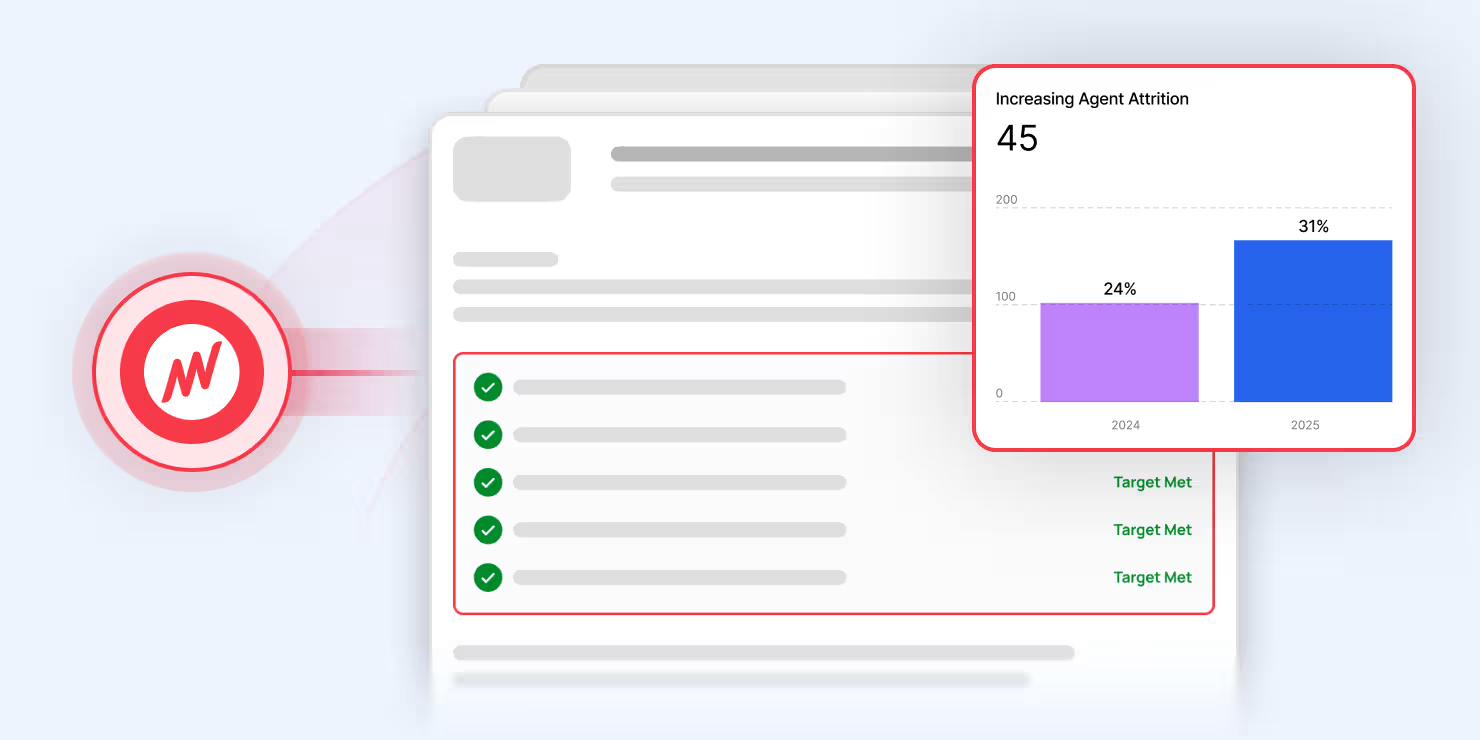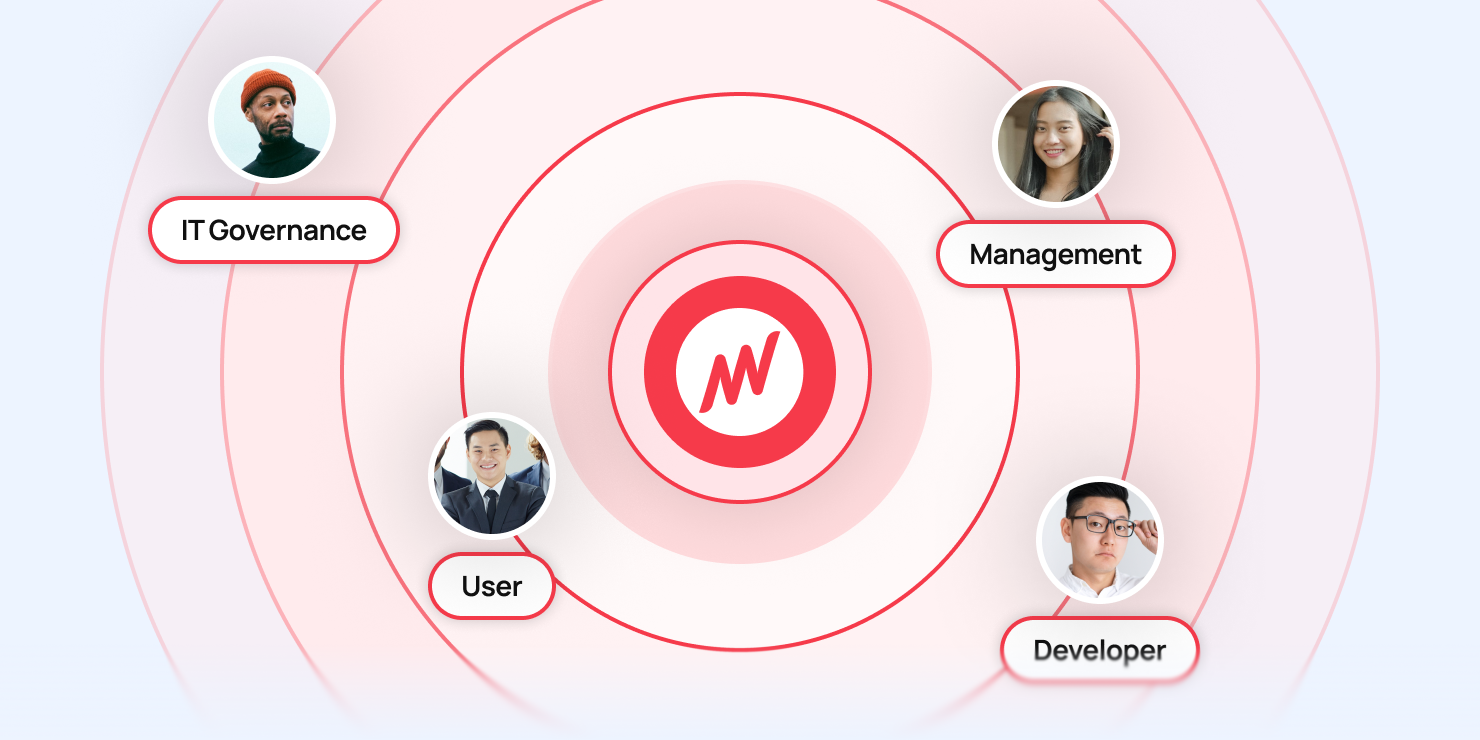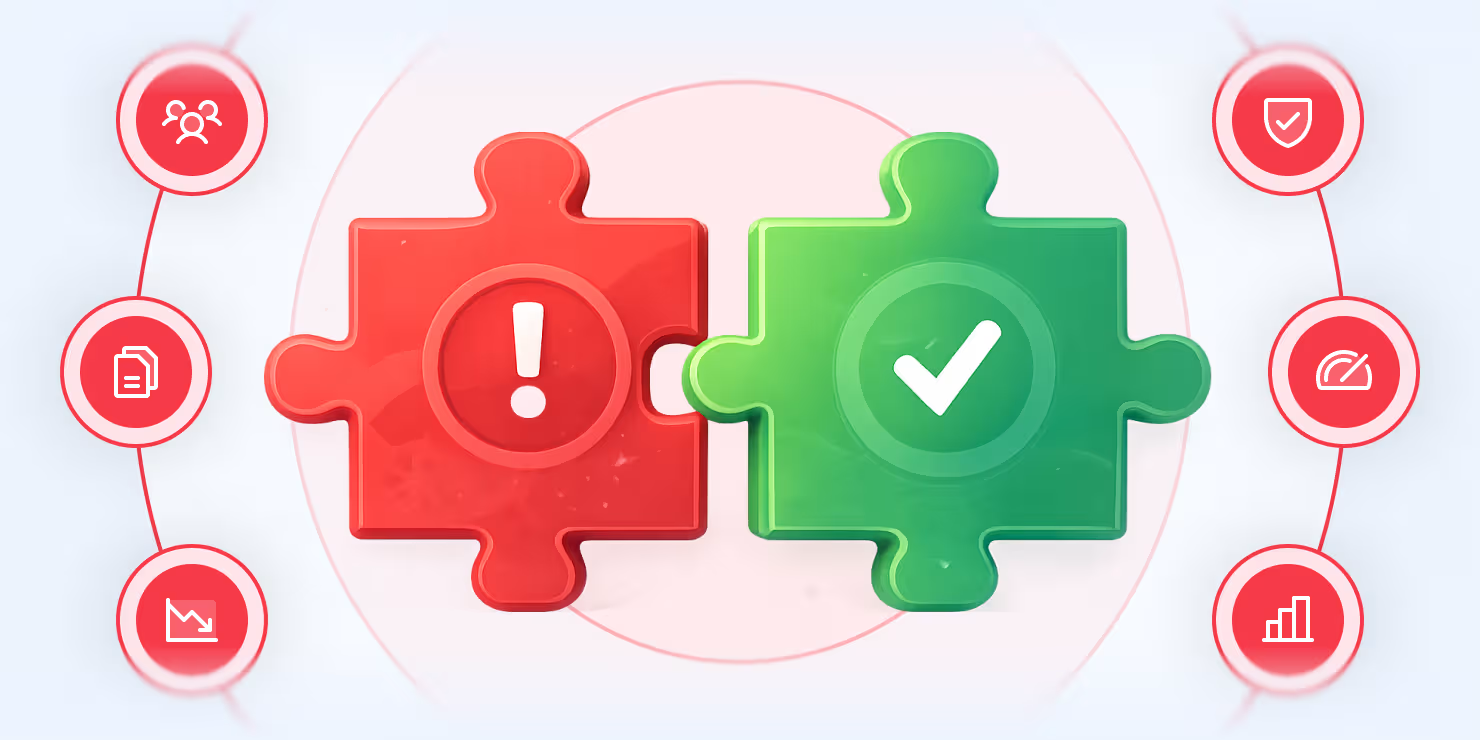
AI assistants are transforming how businesses save money. They automate repetitive tasks, improve accuracy, and reduce the need for additional staffing. From customer support to compliance, these tools help businesses handle complex processes efficiently without overhauling existing systems. Here's how they can cut costs:
AI assistants like Matterway integrate with existing tools, offering quick deployment and minimal IT involvement. They help businesses save on labor, avoid costly mistakes, and stay compliant with U.S. regulations.
Tech Stack Analysis: Costs saving Opportunities thanks to Ai Automation
1. Automated Customer Support
AI assistants have become a game-changer for businesses by significantly reducing one of their biggest costs - customer support. They handle routine inquiries, allowing human agents to focus on more complex issues that require a personal touch.
Modern AI assistants go beyond the rigid, script-bound chatbots of the past. They’re designed to understand context, carry on natural conversations, and work seamlessly across multiple channels. Tasks like password resets, billing questions, and basic troubleshooting are now handled efficiently, freeing up resources for other priorities.
Cost Savings
AI assistants help businesses cut costs in several ways. By reducing the need for large customer support teams, companies save on staffing, recruitment, and training expenses. Their 24/7 availability eliminates the need for overtime pay and reduces the necessity of maintaining teams across different time zones. This round-the-clock efficiency ensures businesses can operate smoothly without incurring extra costs.
Impact on Operational Efficiency
These AI tools don’t just save money - they also boost efficiency. They provide instant responses to customer queries, reducing wait times and improving satisfaction. Their ability to deliver consistent, policy-compliant answers minimizes the need for follow-ups, while intelligent routing ensures that complex issues are escalated to human agents only when necessary. This streamlined approach decreases resolution times and enhances overall productivity. Plus, AI assistants integrate effortlessly with existing CRM and ERP systems, making the entire process smoother and more effective.
Integration with Existing Systems
One of the key strengths of modern AI assistants is their ability to integrate with widely-used platforms like Salesforce, HubSpot, and Zendesk. They access customer history, previous interactions, and account details in real time, enabling personalized responses without customers having to repeat themselves. Thanks to API connectivity, these systems can handle tasks like updating account information, processing refunds, scheduling appointments, and triggering workflows - all with minimal IT involvement. With pre-built connectors, integration is quick and hassle-free, allowing businesses to get up and running in no time.
Compliance with U.S. Regulations
AI-powered customer support systems also help businesses stay compliant with U.S. regulations. They adhere to laws such as the Americans with Disabilities Act (ADA), the Fair Credit Reporting Act (FCRA), and healthcare-specific rules like HIPAA. These systems are equipped with features like automatic redaction of personal data, strict data retention policies, and customer disclosures about automated decision-making. They also maintain detailed audit trails of interactions, which are invaluable for regulatory reviews. By ensuring compliance with laws like the California Consumer Privacy Act (CCPA), AI assistants not only protect sensitive customer data but also help businesses avoid costly legal issues and penalties. For industries with stringent regulations, these systems provide peace of mind while cutting down on operational risks and expenses.
2. Smart Data Processing and Document Management
AI assistants are reshaping how organizations handle data processing and document management. By automating repetitive tasks like reading, extracting, categorizing, and processing documents, these systems work far quicker and more precisely than humans. They're built to manage various document types and ensure that everything gets routed to the right department or person without delay. This is particularly useful for industries like insurance or banking, where managing mountains of paperwork is just part of the job.
Modern AI goes well beyond basic optical character recognition (OCR). These systems can understand context, decipher handwritten inputs, and even flag errors or missing information in real time. They also integrate with existing document management systems, creating searchable databases and keeping files organized - without requiring human intervention.
Cost Savings
Automating document processing can lead to major cost reductions. AI systems reduce the need for manual data entry, cutting down on labor costs and the expenses tied to handling and storing physical paperwork. Many organizations have saved significantly by speeding up processing times and reducing errors, which in turn minimizes the costs tied to rework and compliance issues.
Impact on Operational Efficiency
AI assistants dramatically improve operational efficiency. They process documents much faster than people and work around the clock without breaks. These systems perform real-time validation and quality checks, catching errors early and ensuring consistent data across different databases. Employees can quickly find the documents they need, allowing them to shift their focus to more strategic, high-value tasks. This boost in efficiency also supports smoother system integration across the board.
Integration with Existing Systems
AI document processing tools are designed to integrate effortlessly with popular document management platforms like Microsoft SharePoint, DocuSign, and Adobe Acrobat. Using standard APIs, these systems can be implemented with minimal IT effort. For instance, Matterway's AI assistant is a great example of how easily these tools can be incorporated, offering both effective document handling and user-friendly functionality.
Compliance with U.S. Regulations
AI-powered document systems also help organizations stay compliant with U.S. regulations. They maintain detailed audit trails, track document access and changes, and automatically redact sensitive information when needed. These systems can enforce retention policies that align with regulations like Sarbanes-Oxley and HIPAA, as well as industry-specific standards in banking and insurance. For companies subject to data privacy laws like the California Consumer Privacy Act (CCPA), AI solutions ensure personal data is protected while streamlining processing tasks. Matterway's AI assistant, for example, combines strong compliance features with advanced security, setting a high benchmark for the industry. By blending efficiency, seamless integration, and regulatory compliance, these systems provide a comprehensive solution for reducing costs and improving operations.
3. Predictive Analytics for Resource Planning
AI assistants with predictive analytics are reshaping how organizations plan and allocate resources. By combining historical data, current trends, and external factors, these tools can forecast resource needs with precision. This allows businesses to make smarter decisions about staffing, inventory, maintenance, and budgets.
Modern AI systems take into account variables like seasonal trends, market dynamics, productivity cycles, and even weather conditions. This helps organizations anticipate demand surges, address bottlenecks, and distribute resources more effectively. For example, they can uncover links between local events and spikes in customer service calls or show how a supply chain issue in one region might impact operations across the country.
Cost Savings
Predictive analytics not only streamline processes but also lead to tangible cost reductions. Companies using AI-driven analytics often see savings in areas like inventory management and maintenance. By optimizing inventory levels and predicting when equipment needs servicing, businesses can lower operational costs. Matching staffing levels to actual demand further reduces inefficiencies. Additionally, accurate demand forecasting and energy optimization through smart scheduling can result in significant annual savings.
Impact on Operational Efficiency
Predictive analytics enhance operational efficiency by enabling proactive planning. Teams can prepare for peak periods, ensuring adequate staffing and resources, which minimizes last-minute adjustments and emergency expenses.
This technology also strengthens coordination across departments. For instance, when a surge in customer service demand is predicted, both support and staffing teams can be notified to take action. Similarly, forecasting maintenance needs allows procurement teams to secure replacement parts before equipment failures occur.
AI systems continuously update their predictions, offering corrective actions when actual performance deviates from forecasts. This ensures businesses stay agile and responsive to changing conditions.
Integration with Existing Systems
AI predictive analytics tools are designed to integrate seamlessly with popular enterprise resource planning (ERP) systems like SAP, Oracle, and Microsoft Dynamics. By consolidating data from sales, HR, supply chain, and financial platforms, they create detailed predictive models.
Many solutions come with pre-built connectors for widely used business applications, making it easy to integrate without overhauling existing infrastructure. Cloud-based platforms further simplify the process, scaling effortlessly and providing real-time insights through familiar dashboards.
Compliance with U.S. Regulations
AI predictive analytics systems also help businesses stay compliant with U.S. regulations by maintaining audit-ready documentation of decision-making processes. For industries under EEOC guidelines, these tools reduce bias in hiring and scheduling, ensuring fair workforce planning.
In the financial sector, transparent resource allocation supports adherence to regulations like Dodd-Frank. Healthcare organizations benefit from features that protect patient data and ensure HIPAA compliance, safeguarding sensitive information used in planning. Additionally, accurate resource management can help organizations meet EPA standards and fulfill sustainability reporting requirements.
4. Automated Workflow and Task Management
AI assistants are changing the game when it comes to managing tasks. By automating workflows and providing real-time guidance, they help employees navigate complex processes while cutting down on the need for constant supervision. This combination of automation and on-the-spot support ensures that tasks are completed accurately and efficiently.
Take tools like Matterway, for example. These modern AI workflow assistants don’t just shuffle tasks between queues like older systems. Instead, they actively engage in the process - offering screen-aware guidance, validating data in real time, and automatically routing tasks. This hands-on involvement helps catch mistakes early and keeps everything running smoothly.
AI assistants are particularly effective in hybrid processes where full automation isn’t practical. Think about insurance claims processing: an AI assistant can pull relevant data from submitted documents, check it against policy terms, and guide claims adjusters step by step using built-in standard operating procedures and visual cues. This level of support not only streamlines the process but also delivers measurable savings.
Cost Savings
One of the biggest advantages of AI-powered workflow automation is the immediate impact on costs. By reducing the time employees spend on repetitive tasks and manual data entry, companies see a drop in labor expenses. Faster processing times mean fewer labor hours, which translates to savings on wages and benefits.
AI assistants also help avoid costly mistakes by catching errors early in multi-step workflows, eliminating the need for time-consuming reworks. And because these systems include built-in guidance, training and support costs are significantly reduced, as employees can get up to speed faster.
Impact on Operational Efficiency
Beyond saving money, AI workflow automation boosts efficiency. Tasks that used to involve multiple handoffs can now flow seamlessly, with the AI assistant coordinating activities to ensure nothing gets missed.
Managers benefit from real-time updates, allowing them to quickly address bottlenecks and keep things moving. This means employees can focus on more valuable tasks instead of wasting time on avoidable issues. By proactively managing workflows, AI assistants help teams avoid problems that might otherwise only come to light during reviews.
Integration with Existing Systems
Another major strength of AI workflow assistants is their ability to integrate smoothly with existing tools like ERP, CRM, and industry-specific applications. For instance, Matterway’s deployments show how these systems work alongside current software, creating a unified workflow that uses existing data and processes to full advantage.
Low-code and no-code customization options make it easy for businesses to adapt workflows to their unique needs without requiring extensive programming expertise. This flexibility allows companies to quickly implement AI-powered automation and adjust processes as conditions change, ensuring they stay agile in a fast-moving market. By integrating effortlessly and driving efficiency, AI workflow automation proves its value in reducing costs and improving operations across the board.
5. Better Compliance and Risk Management
Compliance violations can hit companies where it hurts - through hefty fines, legal battles, and damage to their reputation. AI assistants are stepping in to help organizations stay on top of regulatory standards by automating compliance checks, tracking risks in real time, and keeping detailed audit trails. This continuous monitoring approach turns risk management into a smarter and more cost-effective process.
One standout feature of AI-powered compliance systems is their ability to monitor continuously. Unlike older methods that rely on periodic reviews, these systems can catch issues as they happen, giving companies the chance to address problems before they spiral out of control. This kind of instant oversight is especially important in tightly regulated industries like banking, healthcare, and insurance.
AI tools also shine when it comes to reporting. They can automatically generate reports, track changes in regulations, and organize critical documents for audits. By taking over these time-consuming tasks, AI allows compliance teams to focus on the bigger picture and more pressing challenges.
Cost Savings
Using AI for compliance management offers a clear financial upside. Automating routine tasks like monitoring, reporting, and documentation slashes administrative costs while also helping to avoid violations that could lead to severe penalties. Streamlined audit processes further cut down on the time and resources needed for regulatory preparation.
Boosting Operational Efficiency
AI doesn’t just save money - it also makes operations run more smoothly. With features like automated risk scoring and real-time alerts, these systems help compliance teams zero in on the most urgent issues. By addressing potential problems early, companies can avoid bigger headaches down the road. Plus, standardized processes and organized documentation improve efficiency across the board.
Seamless Integration with Existing Systems
Modern AI compliance tools are designed to fit right into your existing workflows. They integrate easily with platforms like customer relationship management (CRM) and enterprise resource planning (ERP) systems, as well as specialized compliance tools. Thanks to secure API connectivity, these systems can pull data from various sources and adapt to new regulatory demands - no need for a complete overhaul of your infrastructure.
Staying Aligned with U.S. Regulations
AI compliance systems are built to align with key U.S. regulations, offering continuous monitoring of transactions and sensitive data. In the financial sector, they support adherence to laws like the Dodd-Frank Act, the Bank Secrecy Act, and Consumer Financial Protection Bureau guidelines. In healthcare, they ensure HIPAA compliance by managing access to protected health information and maintaining audit logs. Industries under FDA or SOX oversight also benefit from constant monitoring of financial controls and other regulatory requirements. Beyond cutting costs, this level of oversight demonstrates a company’s commitment to meeting regulatory expectations head-on.
6. Scalable Back-Office Automation
Back-office operations often hit a wall as businesses grow, with manual processes becoming harder to manage. AI assistants step in to handle tasks like invoice processing, data entry, employee onboarding, and inventory management. Using screen-aware technology, these tools mimic human interactions with existing applications. This means businesses can automate even complex workflows without needing to replace their current systems or train staff on entirely new software. As a result, automation grows alongside the business, delivering cost-efficient solutions without disruption.
In the past, back-office solutions relied heavily on custom software that was expensive and time-consuming to implement. Modern AI assistants, however, offer reliable performance and efficiency, regardless of how much transaction volume increases.
AI-driven automation grows with your business. While adding more back-office staff means higher costs, a single AI system can handle a growing workload. From processing purchase orders to managing vendor relationships and overseeing intricate approval workflows, these systems reduce the need for additional manpower.
Cost Savings
Automating back-office tasks is one of the clearest ways to cut operating expenses. Many businesses report significant improvements in administrative efficiency once automation is in place. For example, automating invoice processing can lower the cost per transaction and reduce expenses tied to paper-based processes, resulting in noticeable yearly savings.
Impact on Operational Efficiency
AI-powered automation can significantly improve how smoothly operations run. Tasks such as approving purchase orders or handling expense reports, which used to take days, can now be completed much faster. Real-time data validation ensures errors are caught and fixed immediately, maintaining data accuracy across systems. Plus, since AI assistants can work beyond regular business hours, teams can start each day with updated and accurate information, keeping workflows seamless and efficient.
Integration with Existing Systems
Modern AI assistants are designed to integrate effortlessly with widely used enterprise tools like ERP systems, accounting software, and HR platforms through secure APIs or direct interactions. This reduces both the time and cost of implementation. For example, Matterway’s interactive screen-aware assistant offers easy setup and strong security, making it a standout option compared to older automation tools.
Compliance with U.S. Regulations
Back-office automation also helps businesses stay compliant with U.S. regulations. By standardizing processes and creating detailed audit trails, AI assistants support frameworks like Sarbanes-Oxley (SOX). For financial operations, maintaining thorough records of transactions and approvals is crucial, and these systems ensure proper documentation for tax reporting as well. Automation not only reduces the risk of compliance issues but also lightens the administrative workload associated with regulatory requirements.
7. Fewer Errors and Higher Quality
Reducing errors not only saves money but also boosts the overall quality of work. Mistakes like incorrect data entry or poor decision-making can lead to costly setbacks. AI assistants tackle these issues head-on by offering real-time validation, ensuring consistent quality checks, and standardizing processes. This helps reduce the unpredictability that often comes with manual tasks.
Unlike humans, AI assistants don’t get tired or distracted. They consistently maintain accuracy, catching mistakes early before they snowball into bigger, more expensive problems. This proactive approach enhances workflows, whether it’s financial operations or customer service interactions.
Using dynamic, screen-aware technology, AI assistants monitor tasks as they happen, flagging errors and guiding users toward the correct actions. This creates a reliable safety net, ensuring that errors are caught before they reach customers or regulators. The result? Smoother operations and greater confidence for human workers.
Cost Savings
Fewer errors mean direct cost savings. Mistakes in areas like data entry, financial processing, or customer service often require expensive fixes. By automating routine tasks with real-time validation and guidance, AI assistants minimize the need for rework, all while maintaining high service standards.
Impact on Operational Efficiency
Improving quality has a ripple effect throughout an organization. When employees receive real-time support, they resolve issues faster, and the need for rework drops significantly. Training becomes quicker too, as new hires can rely on step-by-step guidance from AI assistants, helping them become proficient more quickly while reinforcing best practices. Features like color-coded data and built-in standard operating procedures also improve decision-making, enabling teams to handle more tasks without sacrificing precision.
Integration with Existing Systems
AI assistants fit seamlessly into current setups through robust API connections, working alongside existing software without requiring a complete overhaul. This makes implementation quick and minimally disruptive. Real-time data validation allows these systems to cross-check multiple sources, catching inconsistencies that might otherwise go unnoticed by human eyes.
Compliance with U.S. Regulations
By improving accuracy and reducing errors, AI assistants also help organizations stay compliant with U.S. regulations. Features like continuous data validation and detailed audit trails ensure adherence to strict standards, such as those outlined in the Sarbanes-Oxley Act (SOX). In industries like healthcare and finance, where proper data handling and thorough record-keeping are critical, these tools reduce the risk of compliance violations and make audits much smoother.
Comparison Table
When exploring AI assistants, it's clear that different methods are employed to streamline costs. Traditional RPA platforms, such as UiPath, Automation Anywhere, and Blue Prism, depend on rule-based automation that often demands significant development time and ongoing technical expertise. In contrast, Matterway takes a different path, offering an interactive AI assistant that complements human efforts.
Traditional RPA systems often bring hidden costs, such as prolonged development timelines and the need for specialized support. Matterway, on the other hand, stands out with its faster deployment, reduced maintenance demands, and built-in compliance features - all while maintaining a focus on human-centric design. This makes Matterway a more efficient and flexible choice for organizations looking to optimize their processes.
Conclusion
AI assistants are helping businesses across the United States save money and operate more efficiently. By automating tasks like customer support, data processing, resource planning, and workflows, these tools not only cut costs but also improve productivity. This shift sets the stage for businesses to embrace smarter, more streamlined automation.
Increased compliance and scalable back-office automation further help reduce costly penalties and minimize the need for rework.
Take Matterway, for example. Its human-in-the-loop design brings human oversight into the mix, working seamlessly alongside existing teams. With features like interactive assistance and low-code/no-code customization, Matterway integrates effortlessly into current workflows. This approach allows businesses to stay flexible while keeping costs down.
For companies looking to stay ahead and save money in the long run, adopting an AI assistant like Matterway could be a game-changer.
FAQs
How can AI assistants help businesses stay compliant with complex U.S. regulations?
AI assistants make navigating regulatory compliance much easier. By leveraging predictive analytics, they can pinpoint potential risks before they become problems. These tools are also capable of processing massive amounts of legal and regulatory documents with speed and precision, ensuring nothing important slips through the cracks.
What’s more, they stay on top of changes in U.S. regulations, so businesses can confidently meet current requirements without constantly monitoring updates themselves. On top of that, AI-powered tools deliver clear, actionable insights into compliance needs, cutting down on the chance of errors and lightening the workload for teams. By automating repetitive compliance tasks, these assistants not only save time but also let organizations focus on what they do best - all while reducing the risk of expensive penalties for non-compliance.
What are the benefits of using AI assistants like Matterway in your business operations?
Integrating AI assistants like Matterway into your business systems can bring a host of advantages. One of the biggest perks? Cost savings. By automating repetitive tasks, optimizing workflows, and cutting down inefficiencies, AI can help reduce operational expenses by as much as 20–30%. That’s a significant impact on the bottom line.
These tools also elevate decision-making. With the ability to analyze massive amounts of data and deliver actionable insights in real time, AI empowers businesses to make smarter, faster decisions - something every company can benefit from.
On top of that, AI assistants can transform customer experiences. They handle inquiries quickly and efficiently, shorten response times, and boost satisfaction levels. And let’s not forget about scalability. With AI, businesses can tackle increasing workloads without having to proportionally increase costs, making it easier to grow without stretching resources too thin.
By embracing AI solutions, companies can see real, measurable gains in efficiency, customer satisfaction, and overall performance.
How can AI assistants using predictive analytics help businesses save costs and improve resource planning?
AI assistants use predictive analytics to help businesses fine-tune resource planning and trim operational costs. By examining historical data and spotting trends, they can anticipate future demands, improve resource distribution, and minimize waste. This translates into real savings, like avoiding overstocked inventory, forecasting maintenance for equipment, and managing energy use more efficiently.
Take inventory management as an example: AI can help businesses maintain just the right stock levels, sidestepping the costs tied to excess inventory or running out of products. Similarly, predictive analytics can flag when machinery is likely to need maintenance, cutting down on expensive downtime and repair bills. These applications have been shown to lower operational costs by up to 40%, offering businesses a smart way to boost both efficiency and profitability.









